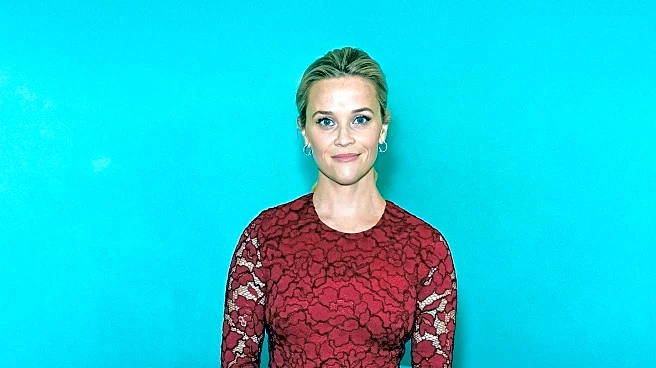What's Happening?
Reese Witherspoon, the acclaimed actress known for her role in 'The Morning Show,' has candidly shared her experiences with postpartum depression following the birth of her daughter, Ava Phillippe. In a recent interview, Witherspoon described the intense
emotional challenges she faced during the first six months postpartum, characterized by constant crying, exhaustion, and unexpected hormonal changes. Despite these struggles, she expressed gratitude for having access to mental health support, a privilege she acknowledges many do not have. Witherspoon also reflected on the pressures of being a young mother at 23, dealing with unsolicited advice, and the overwhelming nature of new motherhood. Her openness sheds light on the often-hidden struggles of postpartum depression and the importance of mental health awareness.
Why It's Important?
Witherspoon's revelations are significant as they bring attention to postpartum depression, a condition affecting many new mothers but often stigmatized or overlooked. By sharing her story, Witherspoon helps destigmatize mental health issues and encourages others to seek help. Her acknowledgment of the support she received highlights the disparity in mental health resources available to different socioeconomic groups. This discussion is crucial in advocating for better mental health care access and support systems for all mothers, regardless of their financial situation. Furthermore, Witherspoon's story underscores the broader societal pressures on women to meet unrealistic standards of perfection, both in motherhood and professional life.
What's Next?
Witherspoon's openness may inspire other public figures to share their mental health journeys, potentially leading to increased awareness and advocacy for mental health resources. Her story could prompt discussions among policymakers and healthcare providers about improving access to mental health care for postpartum women. Additionally, Witherspoon's reflections on anxiety and perfectionism in her career may resonate with many professionals, sparking conversations about workplace mental health and the need for supportive environments that prioritize well-being over unattainable perfection.
Beyond the Headlines
The cultural impact of Witherspoon's story extends beyond mental health awareness. It challenges societal norms around motherhood, success, and mental health, encouraging a more compassionate and realistic understanding of these experiences. Her narrative also highlights the role of family support, as she credits her mother with helping her navigate her mental health challenges. This aspect of her story emphasizes the importance of community and familial support in overcoming personal struggles.















